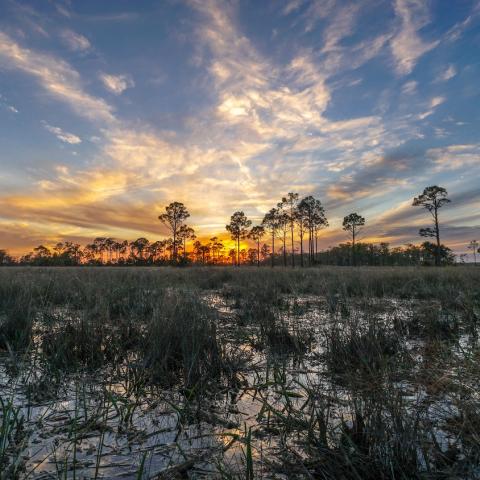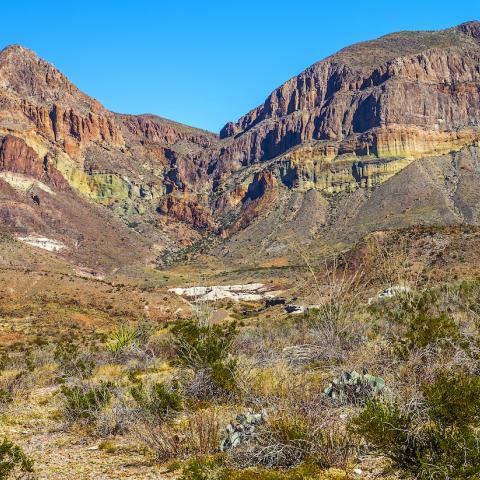
Big Bend National Park staff are working to keep the park open during the partial government shutdown/Big Bend Gazette
Editor's note: The following dispatch from Big Bend National Park was provided by The Big Bend Gazette. It was written by John Waters and Marlys Hersey.
On day nineteen of the partial government shutdown, park managers at Big Bend National Park are busy providing limited services to keep the park open.
Last week, Acting Secretary of the Interior David Bernhardt issued a directive allowing parks to use entrance fees collected under the Federal Lands Recreation Act. Under this directive, entrance fees parks collect can be used to pay for staff to clean restrooms and haul trash during the shutdown—a new interpretation of that law.
The Park Service described action this way: “We are taking this extraordinary step to ensure that parks are protected, and that visitors can continue to access parks with limited basic services.”
“At this point we are unable to speculate or provide information on which parks will be affected by the revised contingency plan,” wrote National Park Service Chief Spokesperson Mike Litterst in an email to the Gazette. “Parks are currently identifying their available balances of recreational fee funds; determining their immediate maintenance, health, and safety needs; and figuring out the staff and resources needed to address those needs. As parks complete their planning in the next couple of days, we’ll be able to provide more detailed information.”
For one park, the “extraordinary step” is was too little, too late. Park managers at Joshua Tree National Park announced the entire 790,000-acre park would close Thursday, only to have that announcement contradicted later in the day by officials in Washington who said the park would be open “by the end of the week.”
Big Bend National Park Superintendent Bob Krumenaker is assessing the new Park Service directive.
“We have direction now, and are developing a proposal, along with a budget, for how we can use uncommitted fee revenue to re-establish some visitor services and strengthen law enforcement/safety in the park,” explained Krumenaker in an email. “That proposal has to be reviewed and concurred with and by [Park Service] regional and national offices; then, as I understand it, the approval rests with the acting secretary of the [Department of the] Interior.”
After that approval is received, Krumenaker can elaborate on which services will be reopened, and an increase in law enforcement staffing.
Law enforcement park rangers are on duty in Big Bend, providing emergency services and enforcing park regulations. Currently, all camping in the park is prohibited, with the exception of one concession-operated campground at Rio Grande Village. All visitor centers are closed and many bathrooms and trash facilities are also closed.
Chief Ranger Lisa Hendy told the Gazette that law enforcement rangers continue on duty, both on the ground and in the air with a pilot who is a law enforcement officer.
Regarding the ‘eyes in the sky,’ Hendy noted, “It is a big place, and he helps us spot problem areas and prioritize responses to violations occurring in areas where we may not know to look right away in this vast landscape. Additionally, we have had a problem with people camping illegally in spite of the closure, and some have built prohibited campfires. We are now entering our fire season, and the potential for a wildland fire to grow before we can effectively respond with only the rangers may become very problematic. The pilot in our aircraft is a fantastic early warning system for us.”
Park visitors are encouraged to report any illegal activity either to park rangers they see in the field or by calling the park dispatch (432-477-2251).
Currently, national parks, including Big Bend, are not staffing entrance booths and therefore unable to collect fees. The same law that is being used for the emergency expenditure of entrance fees allows individual parks to keep at least eighty percent at the park collecting them. At Big Bend, for each car that pays the $30 (per one-week pass), $24 stays at the park.
During the shutdown, the parks, including Big Bend are suffering a double blow by not collecting entrance fees and now being obligated to use funds that were previously collected that could have been used for deferred maintenance, visitor services, and habitat restoration.
According to the Congressional Research Service, in 2017, nationally parks used 52 percent of those funds for maintenance and repair, including deferred maintenance; 22 percent for interpretation and visitor services and other uses including habitat restoration and law enforcement. Currently, the backlog of deferred maintenance at Big Bend is over $100 million.
Courtney Lyons-Garcia, Executive Director of Big Bend Conservancy, a non-profit organization dedicated to promoting, preserving, and raising funds for the park, is undeterred by the closure. “Despite the government shutdown, Big Bend Conservancy is celebrating the park’s 75th birthday all year. We invite you to join us at one of our many events across the state.”
Additionally, the Big Bend Natural History Association which provides funding to the park through book sales at visitor centers is unable to operate as those centers are closed.
Although the park is losing critically-needed funds, individuals can help by making donations to the Big Bend Conservancy (bigbendconservancy.org) and the Big Bend Natural History Association (www.bigbendbookstore.org).
If you are planning a visit to Big Bend National Park during the government shutdown here are a few tips:
* Pack it in, pack it out. (Always a good idea, but especially now.) Bring large garbage bags and be prepared to haul out all of you trash. On a recent visit to the park, this reporter found some trash facilities were accepting garbage, but a larger number were not, with signs asking visitors to transport their trash out of the park. Until the park can resume trash removal, each bag of trash that is packed out reduces the strain on limited resources, and will contribute to the park being able to stay open longer during the shutdown.
* As part of Leave No Trace practices, bring a trowel and be prepared to dig a ‘cat hole’ for your human waste (organic matter only; pack out soiled toilet paper with you).
* Plan your visit before you go, using the park’s official website, ensuring that you know about and are adequately prepared for hiking and other non-staffed visitor experiences.
* Print out a park map before you go. (Note: cellular phone service is spotty to non-existent in many places in the park, so do not expect to rely on your phone for map referencing.)
* Plan where you will stay overnight outside of the park before you go, and make reservations; accommodations in the park (at the Chisos Mountains Lodge) and in nearby communities of Terlingua, Lajitas, Marathon, and Alpine are open. Call ahead.
* As always, have plenty of water, food, sunscreen, hat, sunglasses, and layers of clothing for all types of weather, and sturdy footwear.
In a late-breaking development, on January 9, the Brewster County Tourism Council took its first actions in response to the government shutdown (which began December 23), by updating its website and issuing a press release extolling that Big Bend National Park is open for tourism. The Brewster County Commissioner’s Court also approved spending up to $100,000 in tourism council reserves on a media blitz.




 Support Essential Coverage of Essential Places
Support Essential Coverage of Essential Places







Add comment